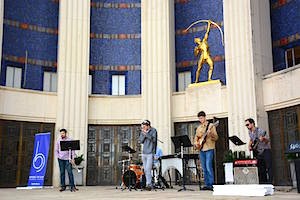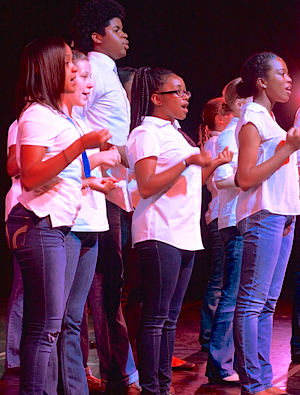Why is entrepreneurship training for music majors garnering so much attention?
It’s no secret that fewer traditional jobs await even the most proficient musicians when they graduate from music school. Combine that with the number of highly-trained musicians and you’ll find some serious supply and demand issues.
Thanks to innovative programs focusing on but not limited to educating students on how to self-start their careers, i.e., “entrepreneurship training,” students are discovering new ways to gear up for working as musicians and in music-related fields. “At the core of entrepreneurship is an ability to create value out of opportunity,” says Alain Barker, director of the Office of Entrepreneurship and Career Development at Indiana University Jacobs School of Music. “My sense is that if you give students the tools to unlock their inner entrepreneurial spirit, there’s no limit to what they can do.”
Music schools vary markedly in what they offer along these lines: from entrepreneurship-related degrees, minors, and certificate programs, to courses, presentations, internships, summer intensives, and cross-campus programs often in collaboration with business schools. Most of what’s out there engages students at their level of interest, so students must seek out these programs to benefit.
Entrepreneurship Training for Freshmen
Some schools are integrating entrepreneurship training for music majors into the curriculum as early as freshman year. Students at Southern Methodist University Meadows School of the Arts take a class called “FACE” (First-Year Arts Community Experience), where they’re introduced to entrepreneurial skills and other important tools for their careers. Each student leaves their first year with a self-created video, elevator pitch and website. This helps them develop their network, as well as their online presence and digital portfolio, says Jim Hart, Director of Arts Entrepreneurship. Students are taught “how to choose an audience they wish to serve, to play a leadership role, and create for and market to the needs of their audience,” he adds.
Freshmen at Carnegie Mellon University School of Music “meet individually with the entrepreneurship team to identify their reasons for pursuing musical careers and optimize their learning experiences to meet their professional goals,” says Monique Mead, who runs the Music Entrepreneurship Program. “In the courses, students will develop business plans, create marketing portfolios, practice stage presence and professional etiquette, learn how to engage current audiences, and build audiences for the future.”
Gabe Pollack had the wisdom as well as the ability to create his own “Jazz Entrepreneurship” major at Oberlin Conservatory. “Entrepreneurship programs add some practicality to a performance degree,” he says. “I loved studying jazz trumpet, but I knew that I was not going to be a professional touring musician. The entrepreneurship program at Oberlin allowed me to pursue my passion for music but also take courses that would help create the lifestyle that I wanted. Even if a student wants to become a professional musician, I think that in today’s times, he/she needs to think of him/herself as an individual business. An artist needs to be creative with marketing, booking, publicizing, and presenting music. Entrepreneurship helps people think creatively about these issues.”
Keane Southard agrees. He received his MM in composition from the University of Colorado Boulder College of Music and his BM in Composition and Theory from Baldwin Wallace University Conservatory, agrees. “Students should take advantage of entrepreneurship programs because mastering your craft is only half the equation of making a career in music,” he says. “Musicians are by nature creative people, and they should also apply that creativity to the business side of their profession and not just the artistic side. Doing so can lead to more opportunities to fulfill yourself as a musician and connect your music with more people, and I believe every musician wants that.” Using his entrepreneurship training, Southard is in the process of planning to hike the New England portion of the Appalachian Trail, compose a large orchestral work inspired by his hiking experiences, and bring several orchestras on board to perform his work.
What Do Students Gain?
Entrepreneurship programs help students learn how to find and create opportunities for their music to be performed. They also learn how to think about creating opportunities where they can apply their musical training and the transferable skills they’ve gained in music school.
Other skills and capabilities students and recent music school alumni report as a result of music entrepreneurship classes and programs:
- writing grant applications
- filling out tax forms
- creating websites and bios
- budgeting
- confidence and increased comfort in public speaking
- creating viable business pitches
- creating business plans
- collaboration
- balancing business savvy with creativity and artistic skills
Why Take Advantage of Entrepreneurship Programs for Music Majors?
Daniel Hickey’s senior year internship at DePauw University School of Music continues to influence his career plans. By managing performances and concert series (including his own) on and off campus, he came away convinced that, “The skills needed to be a successful entrepreneur – organization, communication, creativity, some technology know-how, dedication, outreach, and more – are not only useful to musicians, but are transferable to almost any career. A person who excels in these areas is marketable, reliable, and attractive in every field.”
Beth Rosbach, a professional cellist who was involved with an earlier incarnation of the University of Colorado Boulder College of Music’s Entrepreneurship Center for Music while she was a graduate student, urges students to dive into entrepreneurship programs at their schools. “The nature of the music business has changed drastically over the past 20 years,” she says. “You have to be able to promote yourself and create your own opportunities, because there are simply fewer companies and organizations that will just hand you a job upon graduation.”
Outcomes…
Projects emerging from entrepreneurship programs for music majors include successful student and professional concert series; collaborations with restaurants, clubs and galleries; websites for selling scores and parts for bands and orchestras; private teaching studios; K-12 music programs; and much more.
Specific programs that have emerged include:
Project Opera Camp
Tuition-free camps and programs founded by Kate McKinney and Brenton O’Hara, graduates of the University of South Carolina School of Music. For underserved, marginalized students who learn how to put together and perform an opera while taking classes that teach tangible skills for everyday life: leadership, financial literacy, resisting drugs, healthy communication.
Bridge the Gap
A chamber music initiative founded by current and former SMU Meadows School of the Arts students to make chamber music more accessible by bringing it into unexpected settings such as parks and nightclubs.
Bop Stop
Cleveland-based jazz club featuring public performances as well as music and arts instruction, music therapy, and early childhood arts education. Directed by Gabe Pollack, an Oberlin Conservatory graduate.
New Voices Opera
An opera company run by Indiana University Jacobs School of Music students, featuring next generation operatic composers with the intention of creating relevant opera for modern audiences.
Cezanne String Quartet
Dallas-based chamber music ensemble composed of four SMU Meadows music students and alumni. In residence at SMU from August 2015 – May 2017.
Kenari Quartet
An award-winning saxophone quartet formed by students and alumni of Indiana University Jacobs School of Music, featuring music of various genres.
Sphere Ensemble
Colorado-based professional string quartet founded by Beth Rosbach, a graduate of the University of Colorado Boulder College of Music.
South Dallas Strings Program
An offshoot of Bridge the Gap (see above), bringing music to underserved schools in the Dallas area through SMU Meadows School of the Arts students and resources.




Seth
This is so true and I’m really thrilled to see that this is starting to catch on. The most beneficial skill I’ve learned since graduating is how to identify problems that others have and position myself as the solution to their problem. Whether that’s performing or combining on of your other skills with your knowledge of music there are tons of opportunities out there for those that are savvy enough to look to recognize those opportunities. Great post!